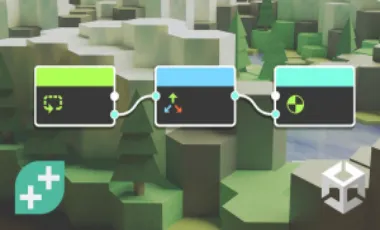What You Will Learn:
- Introduction to Editor Scripting: Understand the basics and importance of editor scripting in Unity.
- Creating Custom Inspectors: Learn how to create custom inspectors to modify and enhance the Unity Editor interface.
- Integrating GUI Tools: Effectively use GUI tools to create intuitive interfaces for level editors and tools.
- Managing Editor Modes: Implement different editor modes to streamline workflows and increase productivity.
- Advanced Gizmos and Handles: Utilize Gizmos and Handles classes to visualize and interact with game objects in the editor.
- Custom Property Drawers: Create custom property drawers to enhance the editing experience of specific game components.
- Building DLLs: Build and use DLLs to extend Unity’s functionality and manage large projects efficiently.
- Automating Texture Import: Automate the texture import process to standardize asset management.
- Integrating Version Control Systems: Integrate version control systems like Git for collaborative development and project management.
- Creating Custom Editor Tools: Develop specialized editor tools, such as object manipulators and scene management tools, to simplify game development tasks.
Requirements:
- Familiarity with Unity: Basic understanding of the Unity interface and how to navigate within the Unity Editor.
- Proficiency in Programming: Basic knowledge of the C# programming language, including variables, loops, functions, and classes.
- Unity Scripting Experience: Basic experience in writing scripts in Unity, including understanding and creating MonoBehaviour scripts.
- Object-Oriented Programming (OOP): Understanding of OOP principles such as inheritance, encapsulation, and polymorphism.
- Unity Asset Management: Understanding of importing and managing assets in Unity, including textures, models, and prefabs.
- Version Control: Familiarity with version control systems (e.g., Git) and basic concepts like commits, branches, and repositories.
- Math and Physics: Basic understanding of vector mathematics and physics concepts related to game development.
Description: This comprehensive course is designed to take you from beginner to advanced in creating custom tools and extensions within the Unity Editor. Whether you’re a game developer looking to streamline workflows or a programmer aiming to enhance your Unity skills, this course will provide you with the knowledge and practical experience to create powerful custom editor scripts. You’ll start with the basics, gradually mastering intermediate techniques, and ultimately excelling in advanced concepts, fully unlocking the potential of editor scripting in Unity. Join us and transform your Unity development experience!
Part 1: Editor Scripting in Unity – Beginner’s Section In this section, you will be introduced to the foundational concepts of editor scripting in Unity, a powerful feature that allows developers to extend and customize the Unity Editor to boost productivity. Starting with simple “Hello World” examples, you will gradually progress to creating more complex scripts that interact with game objects and assist in building test levels. You will explore the basics of the Gizmos class for visualizing and debugging within the Unity Editor and begin developing a custom Level Creator tool to simplify your level design workflow. By the end of this section, you will have a solid understanding of how to use editor scripting to improve your development processes in Unity.
Part 2: Editor Scripting in Unity – Intermediate Section Building on the foundation from the beginner section, this intermediate section delves into more advanced editor scripting techniques. You will learn how to create and manage custom inspectors, property drawers, and decorator drawers to enhance the functionality and usability of your tools. This part also includes integrating Palette windows with inspectors and introducing different editor modes and GUI styles. By the end of this section, you will be proficient in creating complex editor tools and custom interfaces, making your development process more efficient and tailored to your specific needs.
Part 3: Editor Scripting in Unity – Advanced Section In the advanced section, you will tackle the most complex aspects of editor scripting in Unity. This includes adding build features, collaborating with version control systems like Git, and developing comprehensive object manipulation tools. You will explore custom search functionalities, prefab replacement systems, and creating advanced GUI components. This section also covers distributing custom tools, ensuring they are polished and suitable for large projects. By the end of this section, you will master the art of editor scripting in Unity, equipped with the skills to create powerful custom tools that significantly enhance your game development workflow.
Conclusion By completing this comprehensive course on editor scripting in Unity, you will transform from a novice to an advanced user capable of creating complex editor tools and custom workflows. The skills you gain will not only streamline your development process but also enable you to confidently tackle more complex projects. Whether you’re an aspiring game developer or an experienced professional, this course will provide you with the tools needed to elevate your Unity development experience to the next level.
Who This Course Is For:
- Unity Developers: Developers looking to enhance their workflows in the Unity Editor by creating custom tools and extensions.
- Game Programmers: Programmers interested in automating repetitive tasks and optimizing development processes in Unity.
- Intermediate Unity Users: Users with a basic understanding of Unity who want to deepen their knowledge and capabilities within the editor.
- Students and Learners: Individuals pursuing a career in game development or software engineering who want to specialize in Unity development.
- Game Development Industry Professionals: Professionals seeking to simplify workflows and increase productivity through custom editor tools.
- Technical Artists: Artists with a technical background or interest in scripting who want to create tools to assist with asset management and scene building.
- Independent Game Developers: Indie developers looking to leverage Unity’s flexibility by creating custom tools and workflows to meet the specific needs of their projects.
Related Articles:
Unity Visual Scripting: Learn Game Coding The Easy Way
Build a Poker Game in Unity: Complete Development Course
Click here to view the full details of the resource.:URL
Click the button below to download.
Download:



